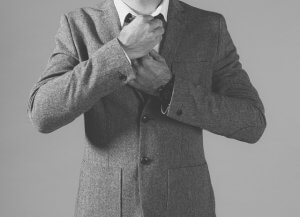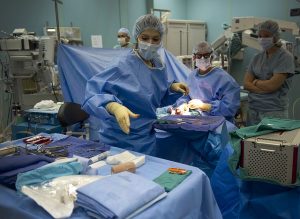When you are interviewing for a residency slot, confidence is the key to success. This can be a huge challenge when stress and a perceived need to please get in the way of holding on to any self-confidence. Forcing confidence can turn the tables from positive to negative, and it is important to make confidence authentic. This puts candidates in a conundrum when trying to exhibit confidence. It can’t be forced, it may not be natural, but it has to be authentic. No wonder interviews are stressful! It is not impossible to learn how to be confident during an interview. In fact, practicing confidence in preparation for an interview can ensure that it is genuine and effective.
Eye Contact
One of the biggest ways to appear confident is to maintain eye contact during conversation. Depending on your home country’s culture, this may be difficult. That is why practicing making eye contact during conversation is essential to the success of an interview. You don’t want your eye contact to appear awkward or forced. Most residency program interviews will have multiple people involved in the interview. It is okay to favor eye contact with the program director over other participants, but make sure you give everyone some of your attention. Shifting your gaze will also prevent you from staring, which can look odd and uncomfortable. Practice interviewing with friends and family, but make sure they are native to the U.S. and willing to give you any tips on correctly using eye contact to exhibit confidence.
Posture
 Standing and sitting with good posture also reflects confidence. Cowering in the face of judgement in front of interviewers shows that you are not confident in your skills, and you must exude confidence in your posture both in front of your interviewers in your patients. Practice holding your head up high, and make it a habit to hold your shoulders back. It will become natural, and you won’t feel odd doing it during your interview.
Standing and sitting with good posture also reflects confidence. Cowering in the face of judgement in front of interviewers shows that you are not confident in your skills, and you must exude confidence in your posture both in front of your interviewers in your patients. Practice holding your head up high, and make it a habit to hold your shoulders back. It will become natural, and you won’t feel odd doing it during your interview.
Smile
A smile is essential to greeting new people, but a smile can be done incorrectly. This can be especially difficult if your own culture does not commonly use “toothy grins.” The key to a good smile is to do what you can. Not everybody looks genuine with a wide-mouthed tooth-revealing smile. It is okay to make it small, but make sure it makes you relatable.
Handshake
 In America, everyone appreciates a firm handshake. This doesn’t mean it is a power struggle between you and the recipient. Rather, a limp handshake feels wrong and weird. Too strong of a handshake feels like you are insecure. Firmness should be warm and indicative of your earnestness.
In America, everyone appreciates a firm handshake. This doesn’t mean it is a power struggle between you and the recipient. Rather, a limp handshake feels wrong and weird. Too strong of a handshake feels like you are insecure. Firmness should be warm and indicative of your earnestness.
Slow Down
It is very common to speed up your speech patterns when you are nervous. It is okay to show some nervousness during your interview, but ramping up the speed of your speech can make it difficult for interviewers to understand you and will leave more room for errors in your speech. Take a breath. Slow it down. Make sure you are saying what you meant to say and not rambling.
Listen
One of the biggest mistakes you can make in an interview is not listening. This may sound obvious, but it is very typical for an interviewee to talk too much and even interrupt because of nervousness. Don’t let this be you. Take the time to think about your interactions with your interviewers. Are you listening? Are you responding when appropriate? You must stay engaged during an interview in order to show confidence, and this can be lost if you let your nervousness take over.
Ask Questions
Don’t just respond to questions. Make sure you have some questions to ask. This shows that you are truly interested in finding a good fit in your residency choice. It shows interviews that you’ve thought about what you want out of your residency, and you are confident enough to ensure you get it. This works almost like reverse psychology. If you ask questions, it makes interviewers feel like they are being interviewed, which makes them feel like they want you. This may not always work, but it definitely shows that you are looking for the right spot, and that shows confidence and self-worth.
Practice Makes Perfect
All of the tips to appear confident in an interview might seem elementary, but they work. The trick is to perfect these methods to make them seem authentic and effortless. That means practice, practice practice. Make sure to practice your interviewing techniques and include these tips. It’s not all about having the right answer. It is also about having the right demeanor and personality to make program directors know that you have the confidence to make crucial medical decisions. Confidence is necessary in any medical profession, so you have to show confidence to rank highly with your prospective residency programs.




